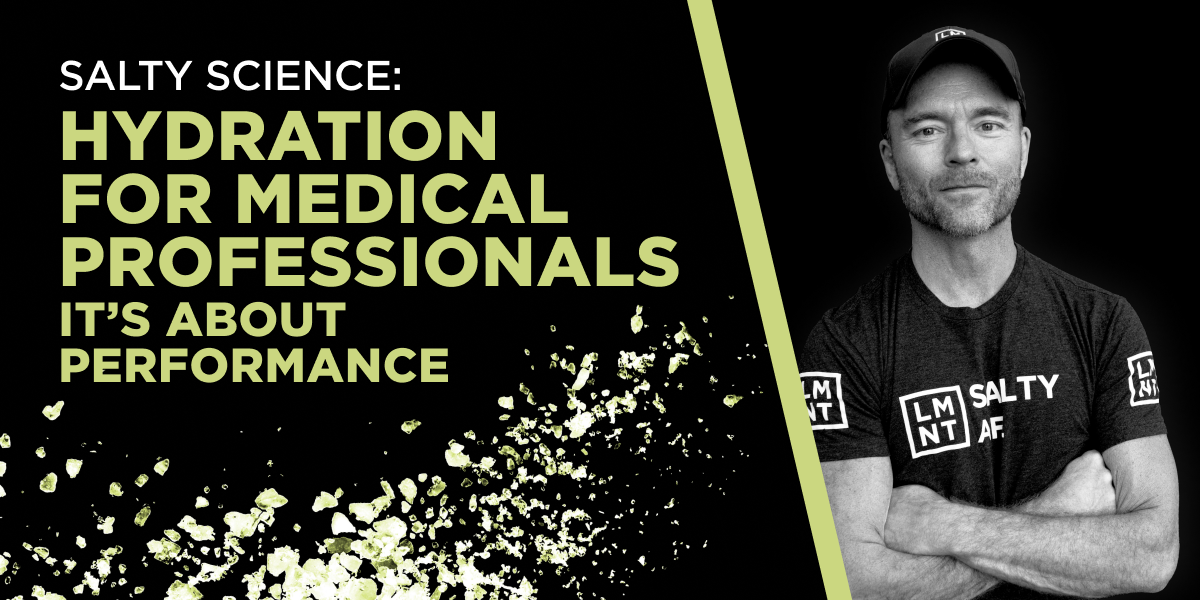There’s an underappreciated challenge facing doctors, nurses, and other medical professionals: staying hydrated during long work shifts. For example, many surgeons even embrace dehydration to avoid re-scrubbing during surgery. Ignoring or discounting hydration, however, can affect focus, cognition, and performance in settings with small margins for error.
Even mild dehydration (1-2% loss of body water) can affect cognition and performance, and water is only half of proper hydration. You lose electrolytes—mainly sodium—through sweat, urine, and respiration, and staying sharp demands you replenish them.
Unfortunately for medical pros, it can be difficult to stay properly hydrated during long shifts in sterile, arid work environments. In one survey-based study, 91% of 79 surgical trainees reported dehydration symptoms (headache, constipation, orthostasis) in the operating room. And 71% of the trainees believed that dehydration “frequently” impacted their performance. Another study on doctors and nurses revealed similar results: measurable cognitive impairment was associated with higher dehydration rates at the end of their shift compared to the start. I’ll talk more about these studies shortly.
It’s especially important that medical workers have easy access to both water and electrolytes. Their health—and our health—depends on it. In this article I’ll talk about the challenges facing these folks, as well as the causes and consequences of dehydration. Then I’ll suggest guidelines for medical professionals to stay hydrated.
Hydration Challenges Facing Medical Professionals
Healthcare professionals often become dehydrated. The air is dry, the shifts are long, and many surgeons even embrace dehydration to avoid re-scrubbing during surgery. Researchers from the British Medical Journal even suggested that due to dehydration, intensive care unit doctors had lower urinary volume than their patients following a shift.
Systematic data backs this claim. In a prospective cohort study published in Clinical Nutrition, researchers took blood and urine samples from 88 on-call nurses and doctors before, during, and after shifts. At the end of the shift, dehydration rates (measured by urine osmolality) had increased from 36% to 48%. Dehydrated participants also scored significantly lower on two short-term memory tests and trended lower in other tests of cognitive function as well.
Surgeons in the operating room (OR) face a unique challenge: Should they intentionally embrace dehydration to avoid breaking scrub during a multi-hour procedure? (De-scrubbing and re-scrubbing are time-intensive, threaten to derail the operation’s efficiency, and have the potential to introduce contaminants to the OR.) Or should they find ways to stay hydrated to promote optimal, sustained performance?
It’s not an easy question to tackle. The consequences of this tradeoff are significant, but I believe doctors should prioritize hydration. Surgeons should be hydrated during procedures that require intense, prolonged focus. For their patients’ health, as much as for their own.
Let me share a few highlights from a 2021 paper published in the Journal of Surgical Education. In the study, researchers surveyed 79 surgical trainees in general surgery, neurosurgery, and orthopedic surgery. They found that:
- 91% of trainees reported experiencing dehydration symptoms in the OR. Most of these symptoms occurred within the first six hours of operating.
- 70% “frequently” had symptoms like headache, constipation, and orthostasis.
- 71% reported that “dehydration frequently affected their performance.”
- Women were more likely to report dehydration symptoms, difficulty rehydrating, and performance impacts.
Survey data are never perfect, but we clearly have a problem here. Before talking about solutions, let’s delve more into dehydration.
Dehydration In Medical Settings
Dehydration is net water loss from the body. Losing over 5% of body water is generally considered “severe” dehydration, but losses of 1% or lower can be clinically relevant. This water is lost via perspiration, respiration, and gut and urinary routes.
Healthy adults with appropriate fluid access rarely become dehydrated. When body water falls, osmoreceptors signal our hypothalamus to trigger the thirst mechanism. As body water and blood volume rise again, thirst dissipates.
But medical professionals don’t always have appropriate fluid access. When nurses or doctors serve 12-hour emergency room shifts, they could also feel too busy to take a hydration break, or too overwhelmed to realize how dehydrated they are. When surgeons get thirsty, they can’t easily quench that thirst. They’re wearing a mask, and the sterile environment forbids food or drink. Not to mention, avoiding bathroom breaks mid-surgery could mean avoiding consumption of fluids pre-surgery.
When surveyed, healthcare professionals report a range of dehydration symptoms. Common symptoms of dehydration include:
- Thirst
- Dark urine
- Oliguria (decreased urinary volume)
- Dry skin and lips
- Headache
- Cognitive impairment
- Mood impairment
- Muscle cramps
- Fatigue
- Constipation
- Nausea
- Dizziness
- Hypotension (low blood pressure)
- Syncope (temporary loss of consciousness caused by a fall in blood pressure)
- Tachycardia (rapid heartbeat)
Some of these symptoms—dark urine, oliguria, thirst—are more specific to dehydration than others, of course. But when these symptoms align with poor fluid access in medical settings, you have a strong case for dehydration.
Dehydration, Cognition, and Performance
Medical professionals must stay vigilant over long shifts. They need sustained focus to perform well and avoid mistakes.
Dehydration can impair this focus. At 2% water loss, you “see some impact on what we call executive function (higher-order judgment and thinking) and also sustained attention – the ability to continue to be vigilant and focus on a task, even if it’s very boring,” said Dr. Mindy Millard-Stafford, director of the Exercise Physiology Laboratory at Georgia Tech in an NPR interview.
Cognitive impairments may begin even earlier. In one study in Physiology and Behavior, mildly dehydrated participants (around 1% water loss) made significantly more errors in a monotonous driving simulation. The magnitude of impairment was similar to sleep deprivation or (get the headlines ready) having a BAC of 0.08%.
In another study from the British Journal of Nutrition, researchers found that mild dehydration increased fatigue and blunted cognitive performance—in visual vigilance and visual working memory—in young men. We don’t want that in OR.
Electrolytes and Hydration for Cognitive Function
Drinking water is only half the solution to this hydration problem. When you’re deficient in electrolytes, the central nervous system can’t function properly.
This is obvious in cases of low blood sodium (hyponatremia). Many symptoms of hyponatremia—confusion, irritability, brain fog, lethargy, dizziness, etc.—are neurological. Animal evidence also suggests that mere sodium deficiency affects mood and cognition. For instance, rats fed a low-sodium diet showed signs of depression and malaise, foregoing beloved activities like drinking sugar water and pressing the treat lever.
Magnesium, potassium, and calcium disturbances can also affect mental health. Consider that:
- Magnesium deficiency has been linked to anxiety
- Magnesium supplementation improves symptoms of depression
- Potassium deficiency is linked to depression in adolescents
- Hypocalcemia can lead to irritability, fatigue, depression, and anxiety
Yet the above electrolyte issues are generally driven by suboptimal dietary intakes, not hydration habits. That’s where sodium differs. The most common cause of hyponatremia for otherwise healthy people? Overhydration.
Yup. If you drink too much plain water—or sweat excessively without replacing sodium losses—you may notice your body craving salt. Exercise-associated hyponatremia is frequent among elite endurance athletes who pair overhydration with extreme sweat loss. Conversely, you see it resolve when they consume a saline solution.
The same logic applies to medical professionals. Drinking water may not be sufficient to maintain health and functionality during long shifts. If I had to boil it down to one line, I’d advise you to drink electrolyte water to thirst. Let’s expand that principle into guidelines for medical professionals.
Hydration Protocol Guidelines for Medical Professionals
Here are my suggestions for healthy hydration in medical settings. Healthcare pros: feel free to create specific protocols to suit your situation. The important thing is that you and your staff are hydrating regularly with fluids containing electrolytes.
My first recommendation is to watch for signs of dehydration, including 1-5% body mass loss, dark urine, oliguria, and thirst. Quick weigh-ins can flag potential cases of dehydration before they worsen, and self-monitoring thirst and urine volume can cue healthy hydration behaviors. It’s also wise to watch for neurological symptoms, like brain fog and headache, that might stem from inadequate fluid or sodium intake.
The other goal is to prevent dehydration and electrolyte imbalances proactively. To accomplish this, I believe surgeons, on-call doctors, nurses, and other frontline clinicians need regular hydration breaks. Every hour (or two at the most), drink some electrolyte water, allowing thirst to guide your intake. Note that my emphasis is on frequency and quality of hydration—consistent breaks that replace electrolytes losses—not necessarily a set quantity of water, which can lead to fluid overconsumption and needlessly frequent restroom breaks. If this means scheduling breaks for surgeons in the OR, I suggest brainstorming ways to do that safely.
To my knowledge, LMNT is the only electrolyte drink mix with enough sodium to make a meaningful impact. It’s also convenient. Just pour a stick pack into your water bottle, shake it up, and you’re ready. (Note: adding 1/2 teaspoon of salt to 16-32 ounces of water works too. If that seems like a lot, it helps to remember that normal saline is 9g of sodium per liter.)
Hydration is too essential—for both doctor and patient—to neglect. Please help me disseminate this knowledge. Educate your staff, tell your colleagues, and publish your hydration protocols. The more medical professionals we can keep hydrated, the better.

